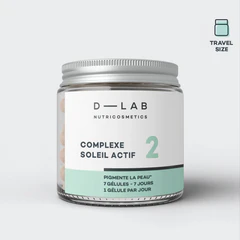
Pregnancy is an incredible time in a woman's life, but it can be accompanied by some disconcerting physical changes.
One of these changes is the hair loss during pregnancy. Even if most expectant mothers have a dream head of hair during pregnancy, massive hair loss is sometimes observed.
Although it's normal to lose a few hairs every day, some women may notice a significant increase in hair loss during pregnancy.
In this article, we explore the reasons for this pregnancy hair loss and share tips on how to prevent it.
I. Hair loss during pregnancy: what causes it?
It's important to note that hair loss during pregnancy is a normal phenomenon that affects many women. There are two main reasons for this phenomenon.
1. Pregnancy and hormones
Increased estrogen levels during pregnancy can affect hair in different ways.
Some women notice an improvement in the texture and appearance of their hair, with increased thickness and shine.
However, other women may experience greater hair loss due to hormonal fluctuations during and after pregnancy.
This hair loss is often temporary and most women regain their normal hair density within a few months of giving birth, others also experience the post-partum hair loss unfortunately.
2. Pregnancy-related deficiencies
During pregnancy, deficiencies in certain nutrients can have an impact on hair health.
As the fetus draws directly from the mother's reserves during pregnancy, deficiencies can occur.
For example, iron deficiency is common in pregnant women and can lead to hair loss during pregnancy.
Essential for hair growth, iron is required for the metabolism of red blood cells, which carry oxygen to tissues including the scalp and hair follicles.
As a result, iron deficiency can slow hair growth, weaken hair and make it more prone to falling out.
Similarly, a vitamin D deficiency can make hair thinner and increase the risk of hair loss, while a zinc deficiency can also contribute to hair loss.
That's why it's essential for pregnant women to ensure a balanced diet rich in essential nutrients for their own health and that of their baby.
II. Hair loss during pregnancy: how to avoid it
While it's not possible to completely avoid hair loss during pregnancy, certain measures can be taken to minimize its impact. Here are a few useful tips:
1. Adopt a healthy diet :
A balanced diet rich in essential nutrients such as protein, vitamins (including biotin and vitamin E) and minerals (such as zinc and iron) is essential for healthy hair. Include foods such as eggs, green vegetables, nuts and whole grains in your diet to promote healthy hair.
See our article: nutrition during pregnancy
2. Avoid stress:
Stress can make hair loss worse. Try to manage your stress by practicing relaxation techniques such as meditation, yoga or activities that help you unwind.
3. Use gentle hair care products:
Avoid hair products containing harsh chemicals that could damage your hair. Instead, opt for gentle, natural hair care products.
4. Avoid excessive heat:
Limit the use of hair dryers, straighteners and curling irons, as excessive heat can damage your hair and make it more susceptible to breakage.
Finally, talk to your midwife or gynecologist. The healthcare professional may prescribe a blood test to identify and supplement any iron or vitamin deficiency.
III. Which products to use to prevent hair loss during pregnancy
When looking for hair products to prevent hair loss during pregnancy, look for those specifically designed to strengthen hair and stimulate growth. Some beneficial ingredients include biotin, vitamin E, zinc, iron and plant extracts such as aloe vera and ginseng.
You can also take a keratin cure, such as the Pure Keratin from D-LAB, compatible with pregnancy and breastfeeding.





